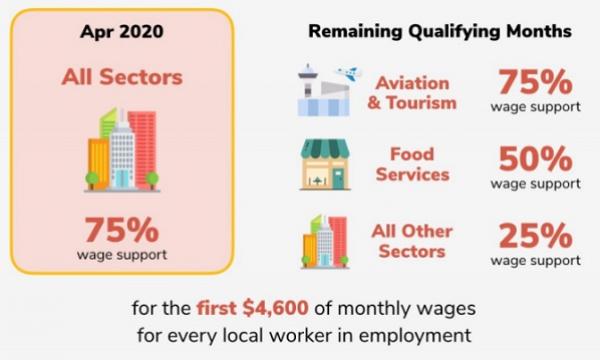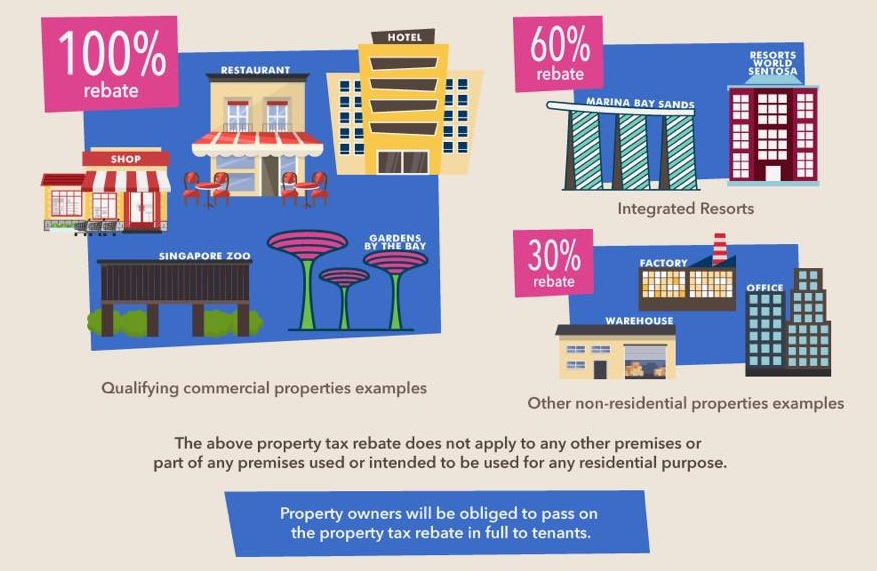Updated as at 22nd April 2020
(including latest update from Ministry of Finance (MOF) on 21st April 2020)
Reading Time: 10 mins
In light of the Covid-19 pandemic that is affecting almost every country worldwide, the Singapore Government has developed a series of supplementary budgets (Unity Budget, Resilience Budget, Solidarity Budget etc.) to support our local businesses as well as Singaporeans in general.
The primary objective is to assist local companies to survive the economic crisis and more importantly, to provide local companies with the necessary cash flow to preserve as many jobs as possible.
Below you can find some of the summary benefits, grants and cost-savings tips that will be relevant for most companies, especially SMEs who are the most badly hit by this crisis.
- Jobs Support Scheme (JSS) for local employees
- Foreign Worker Levy (FWL) Waiver for Foreign Employees
- Cash Flow and Credit Support Measures
- SGUnited Traineeship Programme
- Financing and Credit Support
- Protection Against your Existing Credit Obligations
- Temporary Relief from Legal Action
- Enhanced Wage Credit Scheme
- Covid-19 Work-Life Grant
1. Jobs Support Scheme (JSS) for local employees
Jobs Support Scheme (JSS) is probably the most generous and direct financial support provided by the Singapore government to all Singapore Companies. Under the scheme, the Government will co-fund the first $4,600 of gross monthly wages paid to each local employee for 9 months.

Depending on the nature of business and the business industry you fall under, the level of JSS support for companies is shown in the table below.
| Payment Date |
Payment Amount (calculated on first SGD4,600 of Gross Monthly Wages) |
||
|---|---|---|---|
| Payout | Aviation & Tourism Industry | Food Services Industry | All other Sectors |
| Payout 1:
Apr 2020 |
75% of (Oct 2019 to Dec 2019) Wages |
75% of Oct 2019 Wages + 50% of Nov 2019 Wages + 50% of Dec 2019 Wages |
75% of Oct 2019 Wages + 25% of Nov 2019 Wages + 25% of Dec 2019 Wages |
| Additional Payout:
May 2020 |
75% of Nov 2019 Wages | 75% Nov 2019 Wages | 75% of Nov 2019 Wages |
| Payout 2:
Jul 2020 |
75% of (Feb 2020 to Apr 2020) Wages |
50% of Feb 2020 Wages + 50% of Mar 2020 Wages + (75% of Apr 2020 Wages – 25% of Oct 2019) Wages |
25% of Feb 2020 Wages + 25% of Mar 2020 Wages + (75% of Apr 2020 Wages – 50% of Oct 2019) Wages |
| Payout 3:
Oct 2020 |
(75% of May 2020 Wages – 75% of Nov 2019 Wages) + 75% of Jun 2020 Wages + 75% of Jul 2020 Wages |
(75% of May 2020 Wages – 75% of Nov 2019 Wages) + 50% of Jun 2020 Wages + 50% of Jul 2020 Wages |
(75% of May 2020 Wages – 75% of Nov 2019 Wages) + 25% of Jun 2020 Wages + 25% of Jul 2020 Wages |
Table updated as at 21st April 2020
Qualifying Criteria for JSS
All employers who have made CPF contributions for their local employees (Singapore Citizens and Permanent Residents) will qualify for the payout. No application or registration is required, as all companies are signed up for the JSS automatically. So there is no need to apply.
IRAS will calculate your JSS payouts using the CPF contributions data and will notify you about the payments in the respective months of April, July and October 2020 respectively.
There are however some exceptions for this payout. Wages paid to business owners or employers trading in their own personal capacity will not be eligible for the JSS payout.
Business owners are defined as follows:
- Owner of a sole proprietorship
- Partners of a partnership (general partnerships, limited liability partnerships and limited partnerships)
- Employees who are both shareholders and directors of the company (with Assessable Income for YA2019 of >$100,000)
- Employees who are both members and Directors in the case of a Company Limited by Guarantee (CLG); and
- Employers trading in their own personal capacity hawkers who do not have UEN, employers hiring local personal drivers or local domestic helpers, etc.
Based on the latest MOF update as at 21st April 2020, the government will also be extending the Jobs Support Scheme Payout, to cover wages of employees of a company who are also shareholders and directors of the company. This support will only apply to companies that were registered on or before 20 April 2020, and for the wages of shareholder-directors with Assessable Income of $100,000 or less for Year of Assessment 2019. The May 2020 and subsequent JSS payout will also include back-payment for companies with qualifying shareholder-directors whose wages were excluded from the first JSS payout in April 2020.
Example of how the JSS is computed for the month of March 2020:
| JSS Payout to Employer for March 2020 | |||||
|---|---|---|---|---|---|
| Employee | Gross Month Wage | Qualifying Monthly wage (Capped at $4,600) | Tourism & Aviation (75%) | Food Services (50%) | Other Sectors (25%) |
| Employee 1 (Shareholder + Director) |
$8,000 | $0 | $0 | $0 | $0 |
| Employee 2 (Singaporean) |
$3,000 | $3,000 | $2,250 | $1,500 | $750 |
| Employee 3 (Singaporean) |
$4,500 | $4,500 | $3,375 | $2,250 | $1,125 |
| Employee 4 (Singapore PR) |
$6,000 | $4,600 | $3,450 | $2,300 | $1,150 |
| Employee 5 (EP Holder) |
$4,000 | $0 | $0 | $0 | $0 |
| Total | $$9,075 | $$6,050 | $3,025 | ||
2. Foreign Worker Levy (FWL) Waiver for Foreign Employees
The Foreign Worker Levy (FWL) for 2 months (March 2020 & April 2020) will be waived. This is to assist and improve the cash flow of companies with a higher composition of foreign workers.
In addition, all employers will also receive a one-off FWL rebate of $750 x 2 months for each work permit or S Pass holder, for levies paid in 2020. This is to enable employers to preserve their manpower in order to quickly resume operation.
Eligible employers (with a Corporate Paynow account) can receive the rebate as early as 21 April 2020. For employers without a PayNow Corporate account, the rebate will be disbursed via cheque from 15 May 2020.
In view of the generous support given, employers are advised to provide salary support, including payment for upkeep and well-being of their foreign employees especially during the Circuit Breaker period.
Additional measures announced by the Ministry of Manpower (MOM) to help businesses cope during this period include the following:
- 3 month extension of the levy payment timeline to SMEs with immediate effect, for more flexibility in their cash flow management;
- Levy waiver for up to 90 days with immediate effect for foreign workers on overseas leave; and
- Man-Year Entitlement (MYE) refund for construction firms affected by disruptions arising from COVID-19, with effect from 1 April 2020.
3. Cash Flow and Credit Support Measures
The government has also launched a series of measures to provide additional cash flow and credit support to companies.
3.1 Corporate Income Tax (CIT) Rebate
To help companies with cash flow, a CIT Rebate of 25% of tax payable, capped at $15,000 per company, will be granted for Year of Assessment (YA) 2020.
3.2 Deferment of Corporate Income Tax Payment
The government will be extending a 3 month deferment from income tax.
Companies will pay income tax for financial year 2019 profits starting from July 2020 instead of April 2020. Self-employed persons will also pay income tax for income earned in 2019 from August 2020 instead of May 2020. The tax payments are postponed automatically and there is no need to apply for it.
3.3 Enhanced Property Tax Rebate

For shops, hotels, tourist attractions and restaurants, the property owner will receive a 100% property Tax Rebate for FY2020. Property owners are obliged to pass on the property tax rebate in full to the tenants. The annual property tax savings here will be worth approximately 1 month of rental cost saving for the tenant.
For businesses in other non-residential properties such as offices, factories and warehouses, a 30% property tax rebate will be given to the property owners.
3.4 Enhanced Rental Waiver
To help alleviate costs for businesses located in Government-owned/managed non- residential facilities, the following tenants will qualify for rental waivers:
- Stallholders of Hawker Centres and Markets will now get 3 months’ worth of rental waiver, with a minimum waiver of $200 per month.
- Commercial tenants will get 2 months’ worth of rental waiver in total. Eligible tenants/lessees include those providing commercial accommodation, retail, F&B, recreation, entertainment, healthcare, and other services.
3.5 No increase on Government Fees and Charges for 1 Year
The Ministry of Finance (MOF) freezes all government fees and charges for 1 year, effective 1 April 2020 to 31 March 2021. It means that you will still need to pay them during this period but only at the current rates. The government is not waiving all the fee collections because they are already supporting Singaporeans in many other ways in terms of cash payouts, cash rebates, rental waivers, and etc.
4. SGUnited Traineeship Programme
As part of the SGUnited Jobs Initiative, the government is setting aside S$100 million to fund the SGUnited Traineeship Programme. The programme aims to provide fresh graduates from ITE, polytechnics, universities and other institutions with traineeship opportunities across various sectors, including government R&D institutes, deep-tech start-ups, accelerators and incubators.
These traineeships allow young locals to be equipped with valuable work experience and gain a firmer foothold in the job market during economic recovery. The traineeships can last for up to 12 months, and all trainees will get a monthly training allowance.
The Government will co-fund 80% of the trainees’ training allowances with the host companies funding the rest. Host companies are not required to make CPF contributions as it is not an “employer-employee relationship”.
Only Singapore citizens and permanent residents (PRs) who graduated in year 2019 or 2020, or have graduated earlier and completed National Service (NS) in 2019 or 2020 are qualified for the Traineeship Programme. Interested applicants can look and apply for traineeship opportunities on MyCareersFuture.sg. Host companies can also advertise the traineeship positions with the hashtag #SGUnitedTraineeships.
To date, more than 280 organizations have signed up to offer traineeship opportunities, with more than 4000 opportunities available. The Government aims to bring it up to 8000 this year across all fields.
The SGUnited Traineeships programme will be managed by the Singapore Business Federation and it will work with host companies to review and approve the scope and development plans of the proposed traineeships.
5. Financing and Credit Support
During these bad times, it is even more critical for businesses to have on-going access to financing and credit. The following are some of the available support for companies to apply for:
5.1 Temporary Bridging Loan Programme
Under the Temporary Bridging Loan Programme, enterprises can access to additional working capital to bridge short-term cash flow gaps in their daily operations.
Eligible enterprises can borrow up to S$5 million with the yearly interest rate capped at 5% from participating financial institutions. The Government will provide up to 90% risk-share on these loans (for applications initiated from 8th April to 31st March 2021) and eligible enterprises may also apply for up to 1 year deferral of principal repayment to help manage their debt.
5.2 Enterprise Financing Schemes (EFS)
Under the SME Working Capital Loan and Trade Loan scheme, SMEs will receive greater financing support to bridge their working capital gaps.
| Key Features | |
|---|---|
| Maximum Loan Quantum | $1 Million |
| Government’s Risk Share % | 90% |
| Validity | 8th Apr 2020 – 31st Mar 2021 |
| Principal Repayment | Can be deferred for 1 year |
5.3 Enhanced Loan Insurance Scheme (LIS)
As announced at Supplementary Budget 2020, support for the LIS insurance premium will be increased to 80% (from 50%) until 31 March 2021.
6. Protection Against your Existing Credit Obligations
The Monetary Authority of Singapore (MAS) announced a package of measures to help ease the financial strain on individuals and SMEs caused by the COVID-19 pandemic.
6.1 Defer Payment of Principal on Secured SME Loans
SMEs may opt to defer principal payments on their secured term loans up to 31 December 2020, subject to banks’ approval. SMEs will also be able to extend the tenure of their loans by up to the corresponding principal deferment period if required. This relief will be available to SMEs that continue to pay interest and are in good standing with their banks.
6.2 Lower interest rates for SMEs
Banks and finance companies will be able to apply for low cost funding through a new MAS SGD Facility for loans granted under Enterprise Singapore’s Working Capital Loan scheme and Temporary Bridging Loan Programme.
To get them, the financial institutions need to commit to pass the savings in funding cost to their SME borrowers, which will in turn drive down the interest rates for SME borrowers.
6.3 Assistance with Insurance Premium Payment
SMEs holding general insurance policies that protect their business and property risks can also apply for installment payment plans and pay the premiums on smaller amounts.
7. Temporary Relief from Legal Action.
The Ministry of Law (MinLaw) will be introducing the Covid19 (Temporary Measures) Bill for Parliamentary approval in April.
The Bill seeks to offer temporary relief to businesses and individuals who are unable to fulfill their contractual obligations due to COVID-19. Upon approval, businesses will be able to temporarily defer some of their contractual obligations such as paying rent, repaying loans or completing their work obligations.
The Bill will cover the following contracts:
- Leases or licences for non-residential immovable property;
- Construction contract or supply contract;
- Contracts for the provision of goods and services (e.g. venue, catering) for events (e.g. weddings, business meetings);
- Certain contracts for goods or services for visitors to Singapore, tourists, or promotion of tourism (e.g. cruises, hotel accommodation bookings); and
- Certain loan facilities granted by a bank or a finance company to SMEs.
The Bill will prohibit a contracting party from taking the following legal actions against a non-performing party:
- Court and insolvency proceedings;
- Enforcement of security over immovable & movable property that is used for the purposes of business or trade;
- Call on a performance bond given pursuant to a construction contract;
- Termination of leases of non-residential premises.
In the case of construction and supply contracts, a contractor will be relieved from liability for non-performance caused to a material extent by COVID-19.
Assessors will also be appointed to resolve disputes arising from the application of this Act and they will decide if the inability to perform contractual obligations was due to COVID-19 or not. Parties will not be allowed to be represented by lawyers, and there will be no costs orders. Assessors’ decisions will be final and not appeal-able.
For companies or partnership in serious financial distress, the monetary threshold for insolvency will be increased temporarily from $10,000 to $100,000.
8. Enhanced Wage Credit Scheme
The Wage Credit Scheme (WCS) is also enhanced in Budget 2020. A summary of the changes to WCS is illustrated in the table below.
Table: Summary of Changes to WCS
| Scheme | Enhanced WCS
(as announced in Budget 2020) |
|---|---|
| Qualifying years |
|
| Level of co-funding |
|
| Gross monthly wage ceiling | $5000 (increase from $4000) |
| Qualifying wage increases | Increase in gross monthly wage of at least $50 given to Singaporean employees in the qualifying year, up to a gross wage level of $5000, will be co-funded. |
9. Covid-19 Work-Life Grant
Given the Covid-19 situation, the Ministry of Manpower (MOM) aims to encourage companies to offer/continue with work-from-home and staggered hours arrangements beyond periods when it is mandatory to do so. Companies will be eligible to receive the Flexible Work Arrangement (FWA) Incentive if the employee (Singapore citizen or PR) adopts work-from-home arrangements daily for at least one month. If work-from-home cannot be practiced, staggered hours work arrangements would also be eligible for FWA Incentive.
In addition, the criteria for Work-Life Grant (WLG) have been enhanced to make it easier and faster for companies to apply. Companies will be funded $2000 per worker, for each worker on daily work-from-home and/or staggered hours arrangements for a month, capped at $70,000 per company. The fund can be used in any way the companies require to put in place work processes to implement work-from-home or staggered hours arrangements, including (but not limited to) costs for software/hardware.
Both the current WLG and Enhanced WLG (for Covid-19) will run concurrently but companies are only able to apply for 1 version of the WLG FWA Incentive.
Current WLG vs Enhanced WLG Parameters:
| Parameter | Current WLG criteria | Enhanced WLG criteria | |
| Duration of Flexible Work Arrangements (FWAs) adopted | At least 12 times across 6 months | Daily adoption for 1 month | |
| Type of FWA supported | All FWAs (includes part-time, job-sharing, time-banking, rotating shift/creative scheduling) | Work-from-home and/or staggered hours | |
| FWA initiated by | Employee | Employer or Employee | |
| Disbursement and period allowed to make claims | Two tranches, up to 2 years from Letter of Offer (LOO) | One tranche, up to 4 months from LOO | |
| Existing requirements | No changes to existing requirements. Employers must have adopted Tripartite Standard on FWAs at point of claim. | ||
|---|---|---|---|
Conclusion
The COVID-19 outbreak may be a distressing time, but there are many forms of support available from the Singapore government. While we do not know when the difficult period will end, it is important to stay afloat by adapting your business to the situation and build continuity as much as you can.
If you want to check your business’s eligibility for the above supports or require assistance in any of the applications, our team of experts at HeySara are here to help.




